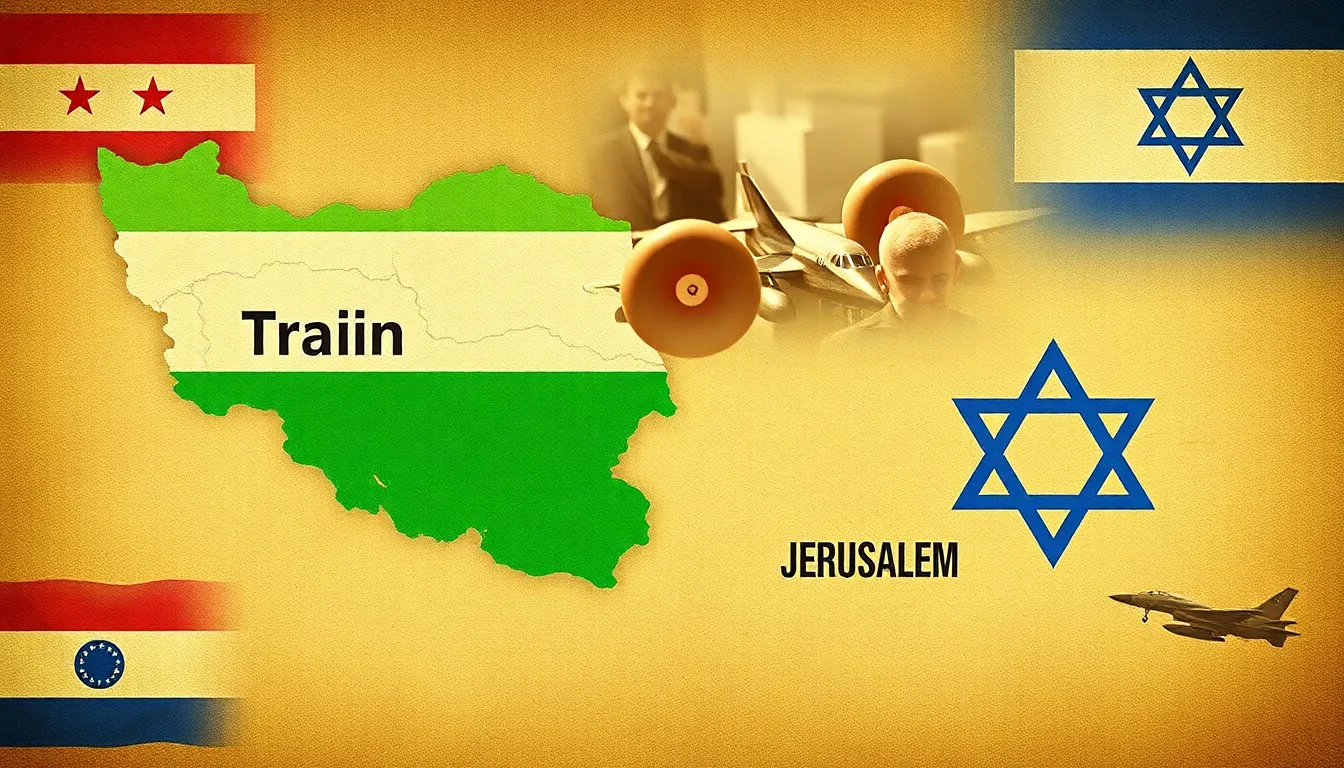Table of Contents
ToggleTensions in the Middle East can feel like a soap opera that never ends, and the latest plot twist has everyone wondering: Did Iran really declare war on Israel? As rumors swirl and headlines scream, it’s time to sift through the noise and get to the heart of the matter.
Overview of the Conflict
Tensions between Iran and Israel stem from historical, political, and ideological differences. Both nations have engaged in proxy conflicts throughout the Middle East, impacting regional stability. Iran’s support for militant groups such as Hezbollah and Hamas directly threatens Israeli security. In response, Israel has conducted airstrikes against Iranian targets in Syria, aiming to disrupt military supply lines.
The rhetoric from Iranian leaders often escalates tensions. Statements calling for the destruction of Israel contribute to fears of direct confrontation. Israel monitors Iranian military advancements closely, especially regarding nuclear capabilities. Iran continues to develop its nuclear program, raising concerns in Israel and the international community.
Recent months have seen an increase in military posturing. Both countries have conducted military exercises, signaling their preparedness for potential conflict. Additionally, various reports suggest that Iranian cyber attacks target Israeli infrastructure, further heightening the stakes. Observers note that these aggressive moves might indicate a strategic chess match rather than an outright declaration of war.
Many analysts believe the situation remains fluid. Diplomatic channels still exist, and negotiations about Iran’s nuclear program are ongoing. Multiple nations, including the United States, engage in efforts to de-escalate tensions. The broader implications of the conflict extend beyond just these two nations, influencing relationships with neighboring countries and global powers.
Consequently, the potential for war hangs in the balance. Clarity about Iran’s intentions remains elusive, with each nation guarding its interests fiercely. Heightened vigilance characterizes both sides as they navigate this complicated landscape, caught between aggression and diplomacy.
Background of Iran-Israel Relations

The complex relationship between Iran and Israel stems from decades of tension rooted in historical, political, and ideological divides. Both nations maintain an adversarial stance characterized by proxy conflicts that impact regional stability.
Historical Context
Iran and Israel shared a cooperative alliance before the 1979 Iranian Revolution. The revolution led to the establishment of an Islamic Republic, drastically changing Iran’s foreign policy. Afterward, Israel became a significant adversary, opposing Iran’s revolutionary ideology. The long-standing rivalry transformed regional dynamics and fostered deep-seated animosities, particularly regarding religious identities and geopolitical alliances.
Key Events Leading to Current Tensions
Several critical events have exacerbated tensions between Iran and Israel. Iran’s support for militant groups such as Hezbollah and Hamas has posed direct threats to Israeli security. In response, Israel conducts airstrikes targeting Iranian assets in Syria, aiming to thwart military supply lines. The assassination of Iranian generals and ongoing military exercises further fuel hostilities. Additionally, Iran’s persistent development of its nuclear program raises alarms, prompting widespread international concern. These events contribute to a fragile situation, where each nation actively engages in strategic posturing to assert influence in the region.
Examination of Recent Developments
Recent developments in the ongoing conflict between Iran and Israel reveal a complex landscape filled with military actions and global reactions.
Military Maneuvers and Statements
Iran continues to conduct military exercises, showcasing its capabilities to deter any potential aggression. Airstrikes from Israel target Iranian assets in Syria, aiming to cripple supply chains and prevent further military entrenchment. Statements from Iranian leaders often include strong rhetoric about Israel’s existence, contributing to rising tensions in the region. Meanwhile, Israel enhances its defense systems in response to perceived threats from Iranian drone and missile advancements. Each action taken hints at a precarious balance of power, indicating an ongoing chess game rather than outright war declarations.
International Reactions
Many nations closely monitor the evolving situation between Iran and Israel. The United States walks a fine line, advocating for diplomatic solutions while supporting Israel’s right to defend itself. Regional powers express concern over potential escalation, with some advocating for dialogue to reduce tensions. Analysts point out that international responses reflect worries about broader regional stability, implicating global alliances and economic ramifications. Increased sanctions or diplomatic initiatives may emerge as countries react to the evolving conflict, focusing on maintaining peace and preventing further military escalation.
Analysis of the Question: Did Iran Declare War on Israel?
The question surrounding Iran’s formal declaration of war on Israel remains complex and multifaceted. Clarity reflects the need to dissect both the legal and geopolitical dimensions involved.
Definition of War Declarations
War declarations represent formal announcements signaling a state’s intention to enter armed conflict. Such actions often require legislative approval and necessitate clear communication to other countries. Usually, declarations articulate the specific grievances prompting the hostilities. International law outlines premises under which these declarations may occur, emphasizing clarity in intent and approach. Additionally, the absence of a formal declaration does not imply the lack of conflict; tensions can escalate without this legal formality.
Evidence Supporting and Opposing Perspectives
Supporters of the argument that Iran declared war cite inflammatory rhetoric from Iranian leaders as indicative of hostile intentions. Statements calling for Israel’s destruction elevate rhetoric to a level of seriousness warranting attention. Moreover, Iran’s backing of militant groups like Hezbollah and Hamas raises alarms about proxy conflicts manifesting into direct confrontations. Conversely, many analysts point out the absence of an official declaration. Military actions from both sides reflect ongoing skirmishes rather than a full-scale war, suggesting strategic chess moves rather than outright conflict. The situation requires nuanced understanding, as interpretations may vary based on political perspectives and geopolitical implications.
Implications for Regional Stability
Iran’s military involvement in proxy conflicts significantly threatens regional stability. Israel consistently views Iran’s support for groups like Hezbollah and Hamas as a direct security concern, compelling it to conduct military operations in response. Airstrikes targeting Iranian assets in Syria aim to disrupt supply lines, reflecting Israel’s proactive defense strategy.
Understanding the historical context aids in grasping the current tensions. The shift in Iran’s foreign policy after the 1979 revolution transformed its position from ally to rival, deepening animosities between the two nations. Heightened rhetoric from Iranian leaders regarding Israel reinforces fears of impending conflict.
Military advancements in both countries contribute to escalating tensions. Israeli intelligence closely monitors Iran’s nuclear program, raising international alarms. Cyber attacks attributed to Iran on Israeli infrastructure signal a new dimension of conflict that further complicates stability in the region.
International reactions shape the broader geopolitical landscape. The United States encourages diplomatic means to resolve disputes while asserting Israel’s right to defense. Concerns from regional powers about potential escalation prompt calls for dialogue to mitigate rising hostilities.
Analysts view the situation as a delicate balance. Military exercises by Iran demonstrate its strength and capabilities, while Israel enhances its defenses to counter threats. Sanctions and diplomatic initiatives may emerge as nations seek to manage and contain the evolving conflict, aiming for a peaceful outcome without triggering a direct confrontation.
The situation between Iran and Israel remains fraught with tension and uncertainty. While inflammatory rhetoric and military actions suggest a hostile environment the lack of a formal declaration of war indicates that both nations are engaged in a complex game of strategy rather than outright conflict.
Regional stability hangs in the balance as international observers call for dialogue and diplomatic efforts to ease tensions. As military posturing continues both countries are likely to maintain a careful watch on each other’s actions. The evolving dynamics of this relationship will undoubtedly influence broader geopolitical developments in the Middle East.




